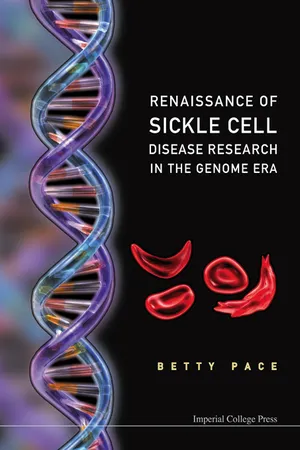
- 396 pages
- English
- PDF
- Available on iOS & Android
Renaissance Of Sickle Cell Disease Research In The Genome Era
About This Book
The Human Genome Project has spawned a Renaissance of research faced with the daunting expectation of personalized medicine for individuals with sickle cell disease in the Genome Era. This book offers a comprehensive and timeless account of emerging concepts in clinical and basic science research, and community concerns of health disparity to educate professionals, students and the general public about meeting this challenging expectation. Contributions from physicians, research scientists, scientific administrators and community workers make Renaissance of Sickle Cell Disease Research in the Genome Era unique among the catalogue of books on this genetic disorder.Part 1 offers detailed review of the National Heart Lung and Blood Institute's leadership role in funding sickle cell research, as well as developing progressive research initiatives and the predicted impact of the Human Genome Project. Part 2 gives an account of several clinical research perspectives based on the Cooperative Study of Sickle Cell Disease. These include recommendations for newborn screening, pain management, stroke, transfusion therapy and pediatric and adult healthcare. Part 3 offers novel insights into basic science research progress and the impact of the Human Genome Project on the direction of hemoglobinopathy research, including hemoglobin switching, bone marrow transplantation and gene therapy. Part 4 engages the reader in a culture-based discussion of the stigma attached to sickle cell disease in the African American community and the apprehensions about genetic research in this community. It concludes with a global perspective on sickle cell disease from African, European and American experiences. For readers seeking a definitive account of sickle cell disease appropriate for students, researchers and community workers, this collaborative effort is an ideal textbook.
Frequently asked questions
Information
Table of contents
- Contents
- Contributors
- Foreword Francis S. Collins and Alan E. Guttmacher
- Acknowledgments
- Introduction . . .The Journey Inward Betty S. Pace
- PART I: THE HUMAN GENOME ERA, A HISTORIC PERSPECTIVE
- PART II: CLINICAL RESEARCH PERSPECTIVES
- PART III: BASIC RESEARCH PERSPECTIVES
- PART IV: COMMUNITY PERSPECTIVES
- Index